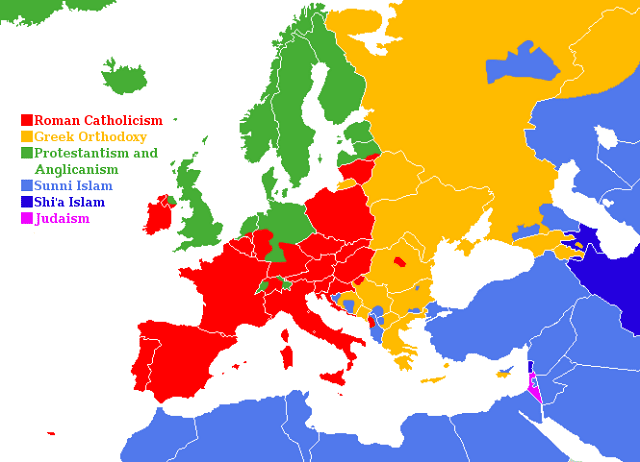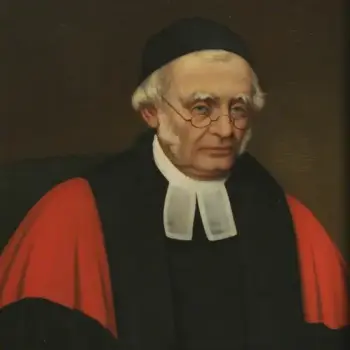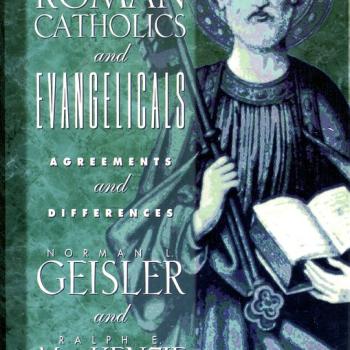
I’ve touched on this question many times before, in various papers. Recently, as part of [one of] my job[s] as staff apologist and forum moderator at The Coming Home Network, I was answering a question from an evangelical Protestant. I’ll paraphrase or re-state his questions (in blue) and give my answers as in my return letter to him:
* * * * *
Catholics make it very difficult because they so often become dogmatic and take a position of “absolute correctness” on the issues on which they differ with their non-Catholic Christian brethren.
This is the nature of Catholic ecclesiology: we believe Catholic dogma is infallible and therefore non-negotiable. The Protestant must understand this. We can’t somehow cease to be what we are just because we are talking to a Protestant. You have to accept us as we are, and we believe in the infallibility of the Church. We must, in turn, understand that you deny that. But we shouldn’t stop talking just because we have honest differences. There is always more room for better understanding.
You have to stop doing this, lest any bridge-building between us be wrecked from the outset.
But this is unreasonable, because you are, in effect, saying:
“x) Unless a Catholic ceases to be a Catholic (in matters of infallibility and ecclesiology), Protestants can’t talk with them and no bridges can be built.”
But (please follow me a bit on this) granting x, real, authentic Catholic-Protestant discussion is impossible to undertake, because Catholic y is no longer Catholic, having been forced to adopt Protestant distinctive z (no infallibility other than the Bible) in order to talk to the Protestant (therefore, in that act, he has ceased to be a consistent, orthodox Catholic).
The Catholic is forced to compromise his or her beliefs to even be allowed at the table. And this is, of course, most unfair and unjust, which in turn, defeats the good will and good faith efforts of constructive ecumenical discussion. Unless each side can accept the other as they are, why even bother? You may not like some things we believe, and vice versa, but that is a given. If we can’t get over these differences on a personal level, as if those who hold them are somehow fundamentally deficient, then we cannot talk and learn from each other at all.
It’s like C. S. Lewis’ notion of “mere Christianity” (and I love Lewis, too: he is my favorite writer). He requires both Catholics and Orthodox, in order to participate in “mere Christianity”, to forsake a doctrine fundamental to both of them: their ecclesiology and belief in an infallible Church. In other words, in the very effort to unite all Christians, if two out of the three major “branches” are forced to abandon something central to their belief-system, how “ecumenical” or fair is that?
My friend Al Kresta, in a 1992 talk that he gave in my own house (that I subsequently transcribed), made this point very eloquently:
Mere Christianity also undermines confidence in the local church, or (if you believe in them) the denomination, which is secondary to one’s primary commitment to Christ. But this is schizophrenic. It pits the head against the body, and ultimately it betrays Jesus Who says the gates of hell would not prevail against His Church, the body. These things are connected. The head doesn’t regard the body as a “necessary evil” like many evangelicals do. They think that you gotta go somewhere to get Bible teaching, so you go to church. [The Church] is secondary only in the sense that it flows from my commitment to God, and is entailed in that commitment. How ecumenical is mere Christianity, if it removes the doctrine of the Church, which is central to two of the three Christian traditions? So it really isn’t very fair to Orthodoxy and Catholicism. [It amounts to saying that] God is not able to adequately reveal Himself through the things that he has made, or the people that He has called. It’s a slap in the face of God.
Mere Christianity is dishonest in that it requires a soft-peddling of differences between Christians. And it belittles our brothers and sisters in the past. When we say “let’s transcend and rise above all these denominational distinctives,” we are actually emasculating the various Christian traditions. The very things that Wesley and Luther and Calvin found as solutions to the problems of their day, we’re saying, “it’s not important. Let’s just get above ’em. It doesn’t matter that these brothers regarded these things as central and essential to the Christian life. We’re so superior to them that we can just rise above it.
And I find that that’s a very belittling approach to these men and women. Accept them on their own terms. Disagree with them if you have to. But don’t say they’re irrelevant. Within their systems, these denominational distinctives are meant to be solutions to serious problems in the Christian life, and when we don’t take them on their own terms, then we’re regarding these men and their traditions as pathological, petty, or unwise. I think Luther was wrong [about justification], but I can’t say he’s unimportant, you see. And that’s what I don’t like about “mere Christianity.”
A truly ecumenical effort would require only aspects that all three have in common: not favoring one and being most unfair to the other two. On the other hand, note that Lewis (in fairness to his position), in the book of the same name, regards mere Christianity as the great common hall of a mansion, but he also says that each Christian can and should have their own “room” (their distinctive Christian tradition or belief-system) that they return to at night.
Protestants have their own set of dogmas, that are non-negotiable, including sola Scriptura and a certain common rigid interpretation of sola fide (the two “pillars” of the so-called “Reformation”). Calvinists are quite non-negotiable on TULIP, aren’t they? Baptists won’t budge on the question of adult, believer’s baptism or on their insistence that there are no sacraments at all, only “ordinances”, or on the fact that their baptism is symbolic only (whereas Augustine and Luther and Wesley believed it regenerates). Quakers and Mennonites won’t forsake pacifism. Etc., etc., etc.
So you guys (as a generality) are not completely different from us. We simply have more non-negotiable dogmas than you do, and so you view us as “inflexible.” We can’t help that. It’s inevitable that you will view us that way. Atheists look at all Christians as “inflexible” and prone to believing unreasonable, silly things. It’s only a matter of degree.
Catholics need to move more “toward the center” so that progress can be made in important areas of disagreement. You hinder any negotiations from succeeding because you are so inflexible.
We can work together in those many areas where we agree, if only we understood each other better. Besides, who defines the “center”? And by what authority? I think we’ll find that, upon examination, this “center” as you define it, will likely again presuppose Protestant distinctives and be hostile to Catholic distinctives. That’s a stacked deck, and thus sabotages authentic ecumenical efforts from the outset, due to its inherent unfairness.
Catholics have to show some real movement. Christians have so much in common. So much more could be done by bridge-building, if Catholics weren’t so stubborn, thinking they have everything right; so frustratingly “certain”!!!!
We can do plenty of that without being forced to compromise our Catholic beliefs, so that we are sufficiently “Protestant” to be able to talk to you at all. That is an insult to us because it doesn’t accept us as we are: a legitimate brand of Christianity as we are, not as the Protestant hopes and wishes we would be, so that we could be more like them.
Think about it. I’ve heard this many times. It’s like saying to a black person: “you know, if you would just act more like a white person, then we could get along, and we wouldn’t have this racial conflict.” That ain’t the way to achieve harmonious race relations. Each side must accept the other as they are and seek to understand them on that plane, not force them to be what they are not, right out of the starting-gate of some conciliatory or bridge-building effort.
***
(originally 11-29-07)
Photo credit: en.wikipedia.user:Sbrools (3-28-07) [Wikimedia Commons / Creative Commons Attribution-Share Alike 3.0 Unported license]
***













